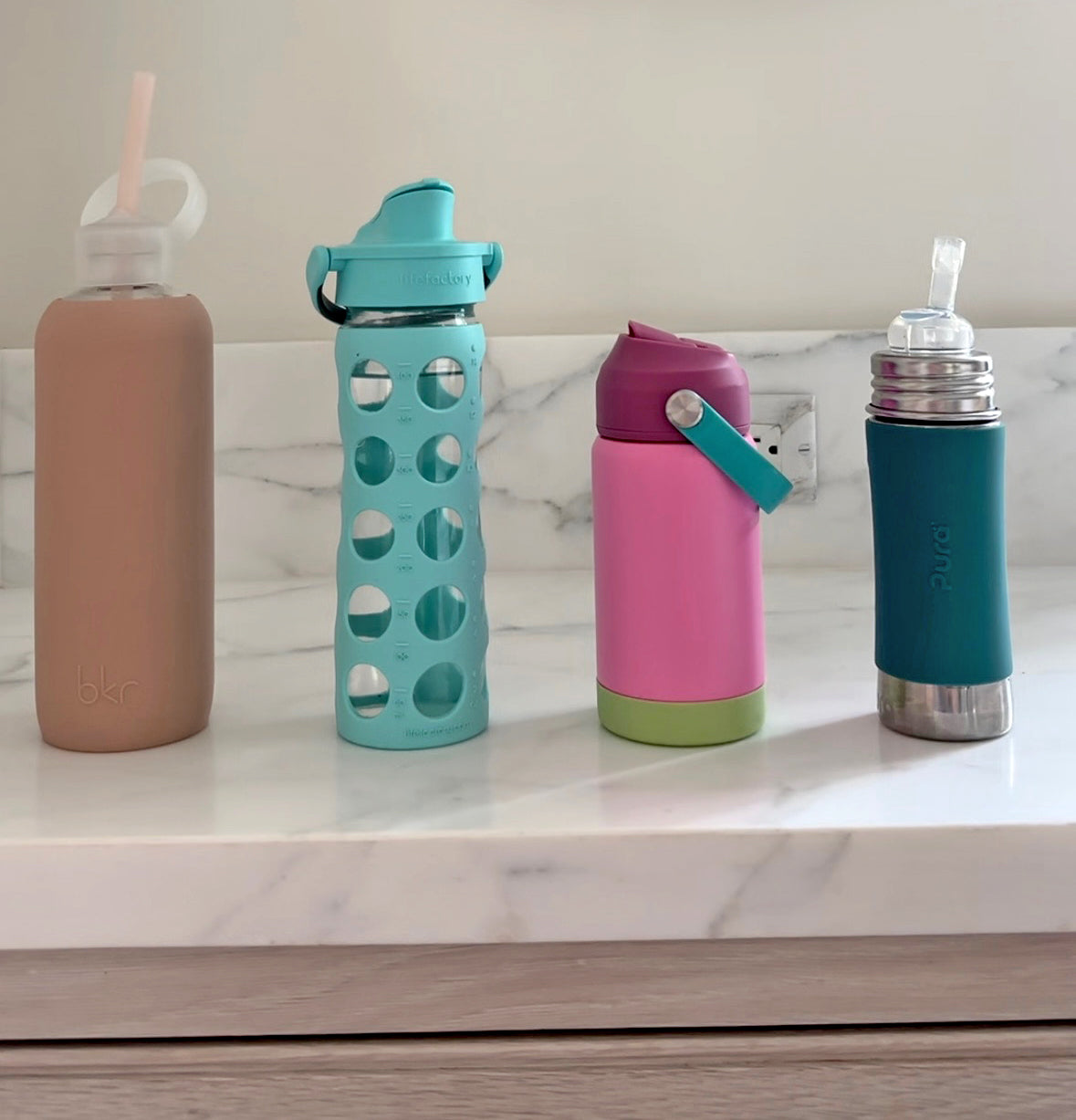8 Ways to Strengthen the Kidneys

The kidneys perform vital functions for the body. They are responsible for removing waste from the body and cleansing the blood. The kidneys, ureters, and bladder together make up the urinary tract. The kidneys maintain fluid balance, electrolyte levels, and remove excess water to produce urine. Urine flows from the two kidneys through tubes, called ureters, to the bladder. Taking care of this system is important for overall health!
Proper kidney function is essential as they help regulate blood pressure, hormones, and the levels of salt/water in the body. The kidneys and the adrenal glands, located on top of each kidney are greatly impacted by environmental factors, our diet and stress.
When the kidneys have an imbalance, the knees, lower back, teeth, hair quality, and ears can all be affected. In addition, weak kidneys can influence lung function potentially leading to the inability to inhale deeply or shortness of breath.
Fortunately, there are many easy, affordable and effective ways to strengthen the kidneys, adrenal glands and bladder. We’re sharing options that can fit into schedules and rotated through as needed (choose what works for you!). Especially if you are dealing with kidney related issues, we recommend incorporating one or some of the following practices and foods to help address imbalances!
8 Ways to Strengthen the Kidneys
#1 Quality Sleep
Quality sleep is important for all of our bodies organs, the kidneys being no exception. We love trying to get to bed by 10 o’clock as the most restorative sleep occurs between 10:00 and 2:00 a.m. Aim for at least 8 hours of sleep to allow the body and repair and replenish the kidneys and adrenals effectively.
#2 Ear Rubbing
The ears and kidneys are energetically connected to the kidneys! We suggest rubbing the ears until red and hot three times a day, once in the morning, midday, and in the evening. The energy from the ears gets sent to the kidneys while stimulating and strengthening their function. If a child tends to have earaches, it can mean that they need to strengthen their kidneys. This is a great exercise to do with kids as they can make it into a game!
#3 Foot Massage
The feet also have a direct connection to the kidney meridian and thus play a very important role in kidney health!
The Yong Quan is the first point of the kidney/bladder meridian at the bottom of the ball of the foot. A simple massage to this point, which might appear to be sore at first, has relieved issues such as:
- Insomnia
- Night sweats
- Anxiety
- Tinnitus
Note: If this point is sore, do not massage deeply or for a long period. As the soreness goes away, more pressure can be applied.
A foot massage before bed is extremely beneficial to the kidneys. Gently massage all of the foot, including the toes, and specifically the area on the bottom of the foot between the ball and the heel. Don’t press too deeply especially if you are in a very weakened condition.
Grounding is another way to strengthen the kidneys. Walk barefoot in grass while the ground is still wet in the morning (if possible). We also love to ground by walking on the beach in the wet sand closest to the water.
Another quick exercise that invigorates your kidney energy through the feet is stomping them for roughly 3-5 minutes. This can be done anywhere and at any time of the day!
#4 Stretching
One of the best ways to strengthen the kidneys is with simple stretching exercises. Stretching movements adds flexibility, strength, and also help to develop the capacity for deep muscle relaxation. If you sit at a desk for prolonged periods, set a short timer and stretch by attempting to touch your toes, lay in a child’s pose, etc.
Stretching Videos:
#5 Sweating
The skin is often called the third kidney! By sweating, we relieve any overload suffered by the kidneys and is another way to eliminate fluids and toxic waste from the body. Increasing the amount we sweat can be an excellent way to take care of kidney function. You can sweat more by
- Incorporating more cardiovascular workouts like medium/high intensity physical exercise or interval training
- Spending time in infrared saunas or dry and wet saunas
- Consuming hot spices like ginger or cayenne pepper.
#6 Rebounding
Rebounding is the act of exercising on a small mini-trampoline. Rebounding puts weight-bearing stress on all cells in the body and is an excellent massage for the lymph system.
Start by getting on the rebounder, gently bouncing up and down without your feet leaving the mat. Build up intensity and time slowly as just two minutes clears the lymph. This can release too many toxins at once if you jump too fast or too long at first.
No rebounder? No problem! You can utilize the same gravitational pull by using an inexpensive exercise or yoga ball.
Even small movements for short periods of time can be very effective! Build up the intensity of the exercise slowly. Video demonstration: Rebounding to Activate the Lymphatic System.
Learn more about rebounding and which rebounders we recommend.
#7 Apply Heat to the Kidneys
Winter time is the best time of year to strengthen and replenish the kidneys. As the temperature drops the kidneys become more active. It is important to know that excess cold weakens the kidneys and adrenals. Keep your kidneys warm, whether or not there are kidney specific issues, by
- Protecting the lower back and kidneys from cold temperatures by dressing to keep the lower back warm.
- Applying local heat using a hot water bottle can provide relief when experiencing lower back discomfort in the kidney area.
- Using a ginger compress. This is one of the most powerful tools for strengthening the kidneys and adrenals!
#8 Relaxation Response
The Relaxation Response, developed by Dr. Herbert Benson, M.D, is a tool used to help balance the nervous system. His book goes into detail on how beneficial this method is for the body and how to practice it. This is great for the chemically sensitive or chronically ill who suffer from kidney and/or adrenal exhaustion. The technique releases the body’s defenses against stress and stress-triggered illnesses, including high blood pressure.
Practice the following relaxation response two times a day for 10 to 20 minutes (20 minutes is optimal). It is best performed on an empty stomach in the morning before breakfast and before your evening meal in the afternoon.
- Sit quietly in a chair with the back straight in a comfortable position and close your eyes.
- As much as you can, deeply relax your muscles, beginning at your feet and progressing up to your face. Keep them relaxed as much as possible.
- Take a breath through your nose and become aware of your breathing. As you breathe out, say the word “one” (or any word of your choosing) silently in your mind to yourself. For example, breath IN . . . OUT, “ONE”; IN . . . OUT, “ONE”; etc. Breathe easily and naturally.
- Continue for 10 to 20 minutes. When you finish, sit quietly for several minutes, at first with your eyes closed and later with your eyes opened. Wait a few minutes before standing up.
Food as Medicine for the Kidneys
Salt Intake
Quality salt is nourishment and medicine for the kidneys. Salt cravings may be the body’s attempt to balance the use of refined raw salt, or a lack of minerals in the body, acidic blood conditions or toxicity including radiation, intake of alcohol, refined sugar, weak digestion or low hydrochloric acid secretion. A moderate amount of good quality salt, with no chemical additives, is beneficial to the kidneys, which in turn can better regulate body fluids. Good quality salt strengthens digestion and can soften or remove abdominal swellings and intestinal obstructions and help move the bowels. We recommend avoiding conventional salt that has added chemicals, as it is damaging to the kidneys and can cause high blood pressure.
Ideally, salt should be used in cooking. Raw salt can be stressful to the kidneys, but if salt is needed at the table, then this easy 5 minute process works! To roast/cook salt
- Preheat the oven to 400 degrees.
- Place 1 cup salt and spread it in a Pyrex baking dish.
- Place salt in oven for 5 minutes.
- Let the salt completely cool before storing in your container.
OR
- Take 1 cup salt and place in a skillet.
- Turn fire on low and stir until the salt releases an aroma.
- Let cool, then store.
If you don’t let it cool completely, condensation will form and the salt will cake up.
Salt Recommendations
- Colima Sea Salt – tested to be free of microplastics.
- Premier Research Labs - not necessary to roast or cook this salt. This salt is table ready!
- Masu Sea Salt - used in medicinal cooking
- Celtic Salt – typically available at Whole Foods
- Redmond Salt
Beans
Cooked beans, especially dark beans, nourish the kidneys. Proper cooking methods increase the medicinal qualities of the beans.To make beans more digestible follow these steps
- Soak beans for 12 hours or overnight in 1 T. lemon juice and water to cover, plus a few inches. Soaking softens skins and begins the sprouting process. Soaking also promotes faster cooking and improved digestibility because the gas-causing enzymes and trisaccharides in beans are released into the soak water.
- Be sure to discard the soaking water. Add fresh water to cover, plus a couple of inches, and a one-inch strip to one whole strip of kombu (sea vegetable available from Eden, health food stores or Gold Mine) to beans, and bring to a boil.
- Skim off foam and continue to boil for 20 minutes without a lid at the beginning of cooking to let steam rise and disperse any remaining indigestible enzymes.
- Cover and simmer or pressure-cook until beans are SOFT.
- Season with sea salt. Do not add salt until beans are totally soft or they will be harder to digest.
- Cook beans for at least 30 minutes after the salt has been added.
Use ¼ - ½ teaspoon sea salt to 1 cup dry beans. Add more salt if your digestion is poor, or if you have odorous gas after eating beans. Also cooking beans with fennel or cumin can help to prevent gas.
Aduki Bean Juice
Aduki bean juice is a beneficial remedy for kidney/adrenal function and bladder infection. Used as a diuretic, for jaundice, boils on skin, or for hair conditions. To make
- Sort and wash 1 cup of aduki beans.
- Soak in water to cover plus 1 T. lemon juice overnight.
- Discard soaking water and add 12 cups fresh water and a 1-inch strip of kombu to beans.
- Bring to a boil.
- Cover and simmer on low for 2 hours.
- Pour off the juice and put it in a container to be kept in the refrigerator. Do not add any salt to the aduki bean juice.
- Leave enough water to cover the beans, so you can add salt and finish cooking the beans.
Have 3/4 - 1 cup warm/hot juice ½ hour before lunch and ½ hour before dinner or before dinner and before bed. Make sure that you have one of your cups between 3:00 p.m. and 7:00 p.m as this is the time the kidneys/adrenals are very receptive to remedies.
Beiler’s Broth
This is a broth for adrenal recovery, energy, and overall health. This combination of vegetables is ideal for restoring acid-alkaline and sodium-potassium balance to organs and glands, especially the adrenal glands. Bieler’s broth is recommended for those under stress or trying to recover their overall health. Make several batches and heat up and have a cup of soup in the mid-morning and/or afternoons for a warming nutritional support and pick me up!
Ingredients needed:
- 4 medium squash (zucchini) – low potassium vegetable
- 1 pound string beans – low potassium vegetable
- 2 stalks celery
- 2 bunches curly parsley
- 1 ½ - 2 quarts filtered water
Instructions:
- Place water, vegetables in the pot
- Bring to boil, skim any foam off
- Lower heat and simmer until soft (covered for about 5-15 minutes)
- Remove from heat and let cool completely (if blending in a plaster blender)
- Blend in a blender until smooth. Blendtec or Vitamix blenders are great!
- Store in glass jars in the refrigerator and heat up when ready to drink.
Parsley
Parsley is an effective medicine for many kidney and urinary difficulties! Parsley tea helps flush toxins and reduces strain on the kidneys. It can strengthen the adrenal glands and is beneficial to the optic nerves and the brain’s neurons.
Parsley tea (drink a cup daily for a couple of weeks)
- Take a cleaned bunch of parsley and 4-6 cups of water and heat just up to a boil.
- Let the parsley steep for 10 or 15 minutes before drinking
- Store in refrigerator
Heat tea to warm when reheating - do not boil. Use parsley in soups and in cooking to add variety.
Soups are very easy to digest and are really nice in the winter. Use ginger in your soups as this helps break down high-protein foods such as meats and beans and lessens the effect of uric acids in the body from eating these foods. Using dried ginger benefits the lower extremities - colon, kidneys, ovaries, sexual organs and legs.
Leafy Greens
Leafy greens contain a calcium/magnesium balance that the kidneys need. For kidney strengthening, try to eat 1 cup of greens minimum every night with your dinner. Turnip greens, mustard greens, dandelion greens, collard greens, and kale are all great options.
To cook greens
- Chop greens.
- Add to a pot with 1 -2 cups water.
- Bring to a boil and simmer for 7 minutes or bring to boil.
- turn off heat and do not lift the lid for about 7-10 minutes. The greens should be bright green and fork tender.
- Add olive oil and salt, if desired.
Drink the green’s liquid before dinner, or add to a soup.
Additional Kidney Healing Foods
Foods that nourish and warm the kidneys are dark beans (such as aduki, black turtle beans, anasazi, black soybeans), parsley, sweet rice, kuzu root, water chestnuts, sea vegetables, spirulina, chlorella, black sesame seeds, millet, string beans, ginger (dried is preferred), onion family (garlic, onion, chives, scallion, leeks), quinoa, trout, salmon, walnuts, cinnamon bark, fennel seeds, fenugreek seeds and cloves.
Potassium and sodium being balanced in the body also helps kidney function. An excess of one depletes the other. To balance sodium intake, make sure your diet has potassium rich foods! Potassium helps trigger your heartbeat which circulates blood throughout your body. In addition, potassium maintains fluid, electrolyte and pH balance in your body, promotes muscle growth, and sustains a healthy nervous system and brain function. It’s a crucial electrolyte that allows your muscles to move easily, lets your brain send nerve impulses throughout your body and helps your kidneys filter blood.
Check out this guide with foods high in potassium!
Oils & fats are also critical to the proper functioning of the kidneys and our overall health. Use only organic, non-inflammatory oils. Inflammatory oils are typically over-processed and suppress our immune system. Learn more about inflammatory/refined oils and how to choose high quality oils.
Additional Tips
- When you eat animal food at a meal, balance it with plenty of vegetables. Excess protein can damage the kidneys. Add grated ginger, raw onions, scallions or chives, as a garnish for soups, with a meal containing meat/fish to aid in the digestion of the protein.
- Microwaving explodes the cell walls of the food and makes them difficult for the body to metabolize. This increases stress on the body so we recommend avoiding microwaving as much as possible.
- Drink purified water (reverse osmosis or ideally drink spring water). Learn more about choosing the best water filter for your area.
- Digestion starts in the mouth. We recommend chewing your foods very well - around 50 to 100 chews per bite, especially if eating grains.
Most Important
- Toss the Toxins in your diet! Removing harmful chemicals from your food is one of the most powerful tools we have to strengthen and heal the kidneys. Learn more in How to Toss the Toxins in Your Pantry and Refrigerator on how to read food product labels and avoid harmful ingredients.
- Tossing the toxins in your home removes a tremendous burden from the kidneys and other organs of elimination. This frees up the body to use its energy to heal, restore, and regenerate, instead of detoxification.
Proper kidney, adrenal gland, and bladder function is essential to our overall health and well being. By implementing some or all of these practices you can prevent and relieve discomfort and/or issues in these organs and glands. This means a happier, healthier you!
Categories

Marilee Nelson
Marilee Nelson is an Environmental Toxins expert who has spent nearly 30 years advocating for the chemically-sensitive and chronically-ill. She is a Board Certified Nutritionist, Certified Bau-Biologist and Bau-Biology Inspector and specializes in Food As Medicine. She has helped thousands of families and individuals identify, heal and recover from toxic exposures and is on a mission to revolutionize the way American families view their health.








